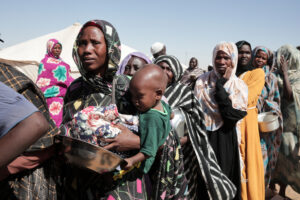What the sponsors of the Global Citizen Conference forgot to mention
60,000 fans waved their smartphones in the air as Beyoncé joined Eddie Vedder to close the Global Citizen Conference last weekend in New York with Bob Marley’s “Redemption Song.” What the socially-conscious fans probably didn’t know is that to supply the minerals to power their smartphones, miners in the Democratic Republic of Congo work 15 hours a day—in mines run by local militia groups, who use violence as a means to secure the mines and their trading routes.
Chris Martin, Michelle Obama, Malala Yousafzai, Ed Sheeran and Leonardo DiCaprio were among the numerous celebrities gathered in Central Park for the conference—which was coordinated with the announcement of the United Nations’ Sustainable Development Goals. In between Beyoncé’s performance of “Single Ladies” and the comedic banter of hosts Stephen Colbert and Hugh Jackman, the 17 Sustainable Development Goals were presented to the audience. The day long concert was filled with hope, music and laughter, but did not mention the smartphone industry’s use of what are called “conflict minerals.”
Before announcing Pearl Jam as the closing act, Hugh Jackman presented the sponsors of the Global Citizen Conference. Among the sponsors, there was mobile communications company T-Mobile. It was probably not in T-Mobile’s best interest to mention the conflict minerals controversy.
The term “conflict minerals” refers to the tin, tungsten, tantalum and gold found in most smartphones, digital music players and laptops. More than half of the world’s tantalum is produced in the DRC, along with the other three conflict minerals. The local militia groups who control the mines use the money to buy weapons and further the cycle of violence in the Congo’s bloody wars. These militia groups make hundreds of millions of dollars from the conflict mineral industry, and will continue to do so as the consumer demand for smartphones and laptops increases.
The crowd instagrammed and snapchatted the U.N.’s goals while Michelle Obama encouraged everyone to use their smartphones to tweet about the various campaigns associated with them. Although it was inspiring, the discourse on conflict minerals was notably left out. The mining industry in the DRC doesn’t promote decent work for all, nor does it promote a peaceful and inclusive society—which two of the goals are supposed to address. The production of electronics that use “conflict minerals” endangers the lives of thousands upon thousands of Congolese and yet, the Global Citizen Conference failed to acknowledge the industry’s failures. If anything, this venue would’ve been the perfect opportunity for producers of “conflict-free” electronics to advertise their materials. In a 2012 report, the NGO RAISE Hope for the Congo showed that companies like Intel, HP and SanDisk have made significant steps in reducing their reliance on conflict minerals.
Sponsors like Google, Gucci, iHeartRadio and T-Mobile provided a lot of money so that the Global Citizen Conference could take place. Although the conference was an optimistic event that recognized many human rights violations, it completely failed to talk about others. In the context of the recently adopted Sustainable Development Goals, groups like Global Citizen should work to recognize the failures of the smartphone production industry. Tweeting and instagraming about the Sustainable Development Goals may help spread awareness. But using a smartphone that relies less on conflict minerals will make more of a difference.
At next year’s Global Citizen Conference, we should emphasize our actions and buying power to end the violent mining of conflict minerals in the Congo, and not rely on our tweets to show support for change.
Clare Church is the Editor-in-Chief of JPI and a M.A. Candidate in International Relations and Journalism at New York University. She completed her undergraduate degree in History and Political Science at the University of Waterloo. Her research areas of interest include indigenous issues, resistance studies, and human rights.




